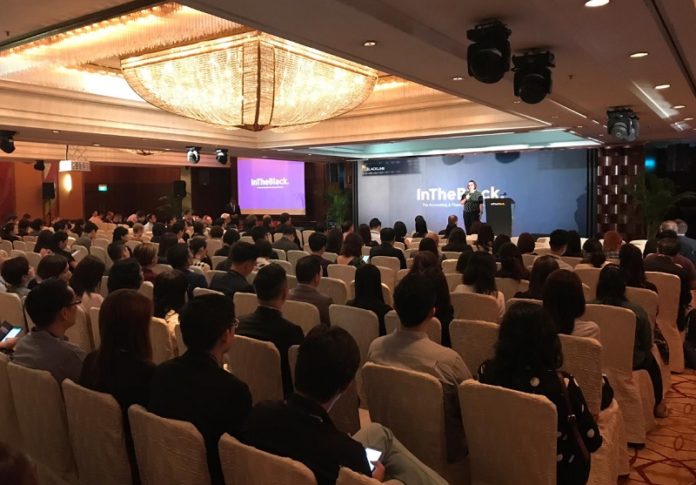The pressure for digital transformation (DX) in the accounting and finance industry rages on, and seems set to escalate further year after year. To keep professionals up to speed on the latest best practices and technology paradigms, BlackLine, a leading financial controls and automation software provider, organised a full-day summit on 15 May at the Marina Mandarin Hotel in Singapore.
Accounting and finance professionals are historically known for obsessing over quantification and audits. Digital transformation is set to change this key business support function into a valuable strategic function.
A key driver of this transformation is trust. BlackLine CEO Therese Tucker kicked off the event explaining the critical balancing act of building and maintaining trust at all levels of the industry.
Other than having the right people with the core competencies in place, good communication, transparency, culture, consistency and empathy are key aspects of setting a foundation of trust on which to launch digital transformation.
Therese pointed out that loving what we do is what gives meaning to our work life, and digital transformation can bring out the meaning in finance and accounting to everyone in the organisation — instead of people considering the function as a necessary burden.
Famous brand names such as Hershey’s, Nike and Campbell Soup, and even Jumbo Seafood (Singapore), were cited as champions of trust, efficiency and insights – perennial attributes that underline any organisation’s survival and growth.
BlackLine Chief Operating Officer Marc Huffman joined the conversation by reiterating how BlackLine’s 2,700 customers rely on the platform to gain the trust, efficiency and insights needed to thrive in the disruption era.
The Future of Finance in the Transformative Age
How will digitisation affect the future of the finance function? Joon Arn Chiang, Managing Partner (APAC Financial Accounting Advisory Services) of Ernst & Young Global Limited, was on hand to paint an accurate picture of current and imminent trends in the unrelenting pace of change sweeping through the industry.
To ride through this global inflexion point, the finance function has to keep up with the DX pressures affecting every function of the business, as well as respond to rapidly changing market conditions fueled by unpredictable online and social media trends.
In reference to the matter of a trust culture, brought up by Therese, Joon Arn called for the finance function to be more “forward-looking” in enhancing management forecasting and risk management. Financial data has to complement non-financial data (e.g., customer behaviour trends) to achieve such predictive tasks.
Joon Arn’s colleague Doris Cheng, APAC Financial Accounting Advisory Services (FAAS) Digital Leader, shared how Ernst & Young Global leverages BlackLine and other technologies to help clients retain the “people element” when undergoing DX.
While technology can automate and even radically transform business, its potential is only as great as the people who use and manage it. Therefore, any DX journey has to centre around corporate culture, the human element, and the trust and faith that bind talent to an organisation’s business success.
Making Digital Transformation a Reality
Tackling digital transformation’s broad scope is never easy. Tammy Coley, Chief Transformation Officer at BlackLine, shared her experiences of assisting client corporations to navigate DX without veering off-track.
Back in 2005, standardising everyone’s excel spreadsheets and filing physical documents were the de facto rigours of accounting, but this was not working out for Tammy’s team. Whenever they had problematic reconciliations, they were expected to do WITTB (What It Takes To Balance) at all costs.
Instead of managing the month-end close, the latter was managing her. Something had to be done, and by 2016, Tammy had launched a pilot for BlackLine implementation to improve things.
Much retraining was needed to get staff used to the new and seamless way of leveraging automation, but the results shone through.
Soon, reconciliations were 80 per cent automated, journal entries were enjoying new visibility, and the month-end close went down from 10 to only three days.
Variance analyses were now more efficient and giving management new insights into the business processes.
With additional BlackLine tweaks, over 90 per cent of journal entries within their ERP system and within BlackLine had been automated. Ownership of internal controls was also streamlined and monitored automatically to ensure continuity even with staff turnover, thus making preparations for year-end audits a smooth and painless process.
By 2016, digital transformation in Tammy’s finance department had melded with the rest of the company’s operations to facilitate agile, insightful business decisions and strategy to keep pace with disruption trends.
Digital Controllership – Explore Your Digital Potential
Controllership – the art and science of supervising a corporation’s financial, accounting and business interests – has gone digital. With a business securely ensconced in a cloud environment, digital controllership offers unprecedented oversight and analytics to improve governance and efficiency.
Deloitte’s Giam Ei Leen, Partner, Audit & Assurance, was on hand to share many case studies on the “art of the possible” – where organisations exploited DX to maximise business potential.
It was noted that the Close-to-Report cycle has been deemed to be a linear process, but it is usually adjusted by process failures (such as breaching of budgets) and last-minute reconciliations and findings.
Now, with the proliferation of cloud-based centralisation of workflows, controllership is moving away from the linear, analogue process towards one that is a real-time practice.
More than 75 per cent of CFOs, according to a survey quoted by Ei Leen, believe that DX can lower the cost of achieving accurate financial reporting. Deloitte has looked at how its clients can benefit from DX to streamline controllership in the digital realm.
From advances in Enterprise Resource Planning (ERP) to in-memory processing of big data for analytics and business intelligence, the Cloud is propelling controllership flexibility to new heights. Myths about cloud migration costs and teething pains that are keeping business on legacy systems were addressed and dispelled.
Data analytics add a powerful lens in digital controllership, and Ei Leen touched on the various types of analytics and visualisation tools that enhance decision making.
The Pathway to Intelligent Finance
The first post-lunch presentation was conducted by SAP’s Regional CFO (Asia Pacific and Japan), Richard McLean. In this presentation, Richard discussed emerging trends and how evolving key technologies, including cloud computing, artificial intelligence, blockchain and predictive analytics, are revolutionising the way Finance is improving change management.
SAP’s role in empowering the intelligent enterprise is to help it make use of data efficiently to offer excellent customer centricity, and to remain agile and responsive to market opportunities and threats.
In the finance and accounting space, the intelligent enterprise benefits from accurate reports and analytics that enhance business intelligence and operations while reducing its risk profile. At the human level, a digitalised finance function empowers all other business functions and enhances change management.
Richard predicted that, in the next three to five years, budgeting periods will become shorter and more dynamic, while analytics will become a core function of finance.
In response, SAP is already priming itself to help its customers tap into the right machine-learning/artificial intelligence technologies while nurturing something that is vital to digital transformation – a learning culture.
Understanding Robotic Process Automation in Finance
Automation using robotic systems (RPA) helps to integrate legacy systems into the latest cloud-based platforms. However, RPA is not a panacea, and has to be applied with foresight about the “where, when and how” of DX planning.
BlackLine’s Senior Director of Product Marketing, Zach Deming, stressed that “bots” cannot yet perform the complex financial analyses that trained humans can. What they can do is facilitate process automation of simple, repetitive tasks required at high speed. By freeing up finance personnel to perform value-added work, RPA complements the workflow and enhances productivity.
What does BlackLine add to the RPA trend in the finance sector? Its machine learning functionality can help by speeding up detail-heavy reconciliations, such as credit card matching or invoice-to-PO matching. In turn, speeding up such transaction matching tasks cuts the errors and delays in the critical month-end close.
According to Zach, RPA tools reduce risk, increase accuracy and improve visibility, all while freeing accountants from the mind-numbing drudgery of manual closing activities.
Talent can then be freed to focus on what really matters to the health and wealth of the business: forecasting, analysis and strategy.
While there are fears of RPA resulting in staff redundancy, Zach counters that these risks can be mitigated as long as professionals remain willing to uptrain and remain relevant.
Clarity of Purpose – Using the New Reporting & Dashboards
Users of BlackLine’s reporting functionality can gain sharp insights into the progress, results and risks of their financial closing processes. Elaborating on this was Solutions Consultant Alex Chai of BlackLine. The new dashboards in the platform now provide users with role-based intelligence so that everyone can take intuitive action and streamline their workflows.
Using motor sports as an example, Alex noted that winning teams bank on timely access to critical and accurate information, in addition to fast and tight team collaboration.
Similarly, BlackLine’s succinct dashboards help visualise key data for users to facilitate fast decision-making based on reliable financial data and insights. When needed, users can drill down into detailed data in multiple dimensions to see what requires attention or reconciliation.
In the area of reporting, BlackLine allows variance analysis to be done during a close and not after, as is the norm in traditional workflows using spreadsheets. Using dynamic actual-vs-budget reports, users can set variance thresholds to detect situations that require attention.
BlackLine’s dynamic tracking of time-sensitive assets also prevents surprises, such as excessive stocks of perishable products nearing expiry dates. Preventing urgent intervention in operations can only lead to fewer human errors and improved clarity for management overview.
Finally, Alex touched on the process improvements that could be identified when rejections in certifications occur. Such a bird’s-eye view allows organisations to improve staff training and morale, leading to a strong and trusting business culture.
Panel Discussion — Tips for Successful Finance Transformation
Transforming the finance function can sound daunting, but it is doable and even mandatory for business survival. Congregating in a panel, the speakers from BlackLine (Tammy), Dyson Singapore (Petra Putzier, Finance Manager) and Globe Telecom, Philippines (Carmeli Briones, Head of Financial Control and Shiela Marie Jimenez, Head of Collection Audit, Group Finance) traded success stories and tips on how to handle challenges and minimise mistakes in the long-term journey of digitally-transformed finance.
Focusing on BlackLine’s automation capabilities, the panelists noted how the tedious manual work of financial processes is now history. Improvements in accuracy, trackability and efficiency now allow their team to focus on the customer – both internal and external.
In place of time spent handling the perennial headaches of audit and compliance, staff now use dashboards to keep tabs on every project within their purview, obtain a big-picture overview of any problems that crop up, and quickly collaborate with cross-functional teams in the company to solve them satisfactorily.
Instead of working in silos, every department can now be tightly linked with each other, boosting agility and resilience. Instead of being just a controller function, finance teams are using BlackLine to add value to other business units’ planning and strategic goals.
The panel noted that while BlackLine is a great DX platform, migrating to such a powerful system does require proper planning, and the willingness to move away from legacy practices that may be treasured — but are ultimately untenable in a cloud-based automation environment.
Throughout the event, the InTheBlack audience gained insights into how companies like theirs approached their DX goals and priorities differently when integrating BlackLine into their digitalisation strategy.
















